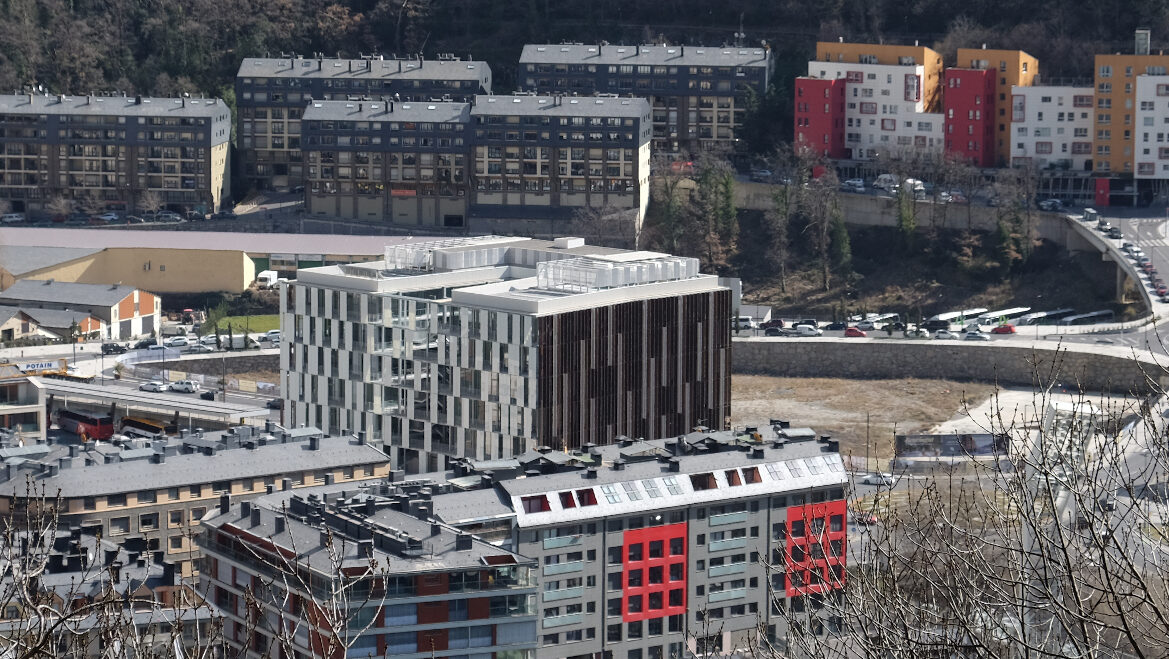Master of Education
The Master of Education aims to train education professionals to the specialist level needed to design programmes on democratic culture and human rights education for educational and social institutions. Depending on the itinerary followed, degree holders will also be able to teach at secondary and high school level, cater for diversity, manage and lead educational centres and projects, and incorporate learning and communication technology into different educational environments. This master’s degree can also lead to research into education or doctoral studies.
The Master of Education is a blended course made up of various itineraries that can be followed independently of one another. There are two different routes depending on whether the student has completed a Bachelor of Teaching and Learning degree or any other first-cycle university studies.
The Master of Education has been evaluated and accredited by the AQUA (Andorran Agency for the Quality of Higher Education), which ensures its quality and European recognition. Students who pass these courses can obtain a master’s degree of Education, a state qualification issued by the Andorran Government.
Distinctive Features
The student can specialise in different areas of education, according to the sector’s current trends and needs: democratic culture; secondary and high school education and professional training in an inclusive school; diversity in education; project and educational centre management; and learning and communication technologies.
The itineraries available can be followed independently of one another, so the student can focus on the areas that interest them the most.
The course offers two different routes, with compulsory itineraries in each of them. The route the student takes depends on whether they hold a Bachelor of Teaching and Learning degree or any other first-cycle university qualification.
The teaching modality is blended in order to allow the student to combine their studies with other professional activities.
The itinerary included on both routes, which is compulsory to complete the course, is on democratic culture. This subject aims to offer educational responses based on the interpretation of the needs and conflicts of the current social, cultural and economic reality, in line with the values promoted by the Council of Europe.
The Master of Education follows the new educational model of the University of Andorra. It’s a competence-based methodology that eliminates the classic concept of the “subject”. It is organised in modules, in which students must overcome a challenge by means of guided work, individual work and seminars. The learning outcomes that lead to the acquisition of specific and cross-disciplinary competences are thus achieved.
European level:
EHEA’s second cycle
Modality:
blended
Credit load:
120 European credits
Duration:
4 semesters
Languages:
Catalan, and some seminars in Spanish and English
Calendar:
from September to June
Contact:
This master’s degree course (120 European credits) is made up of itineraries that can be followed independently of one another, with a series of requirements:
- Democratic Culture: aims to offer educational responses based on the interpretation of the needs and conflicts of the current social, cultural and economic reality, in line with the values promoted by the Council of Europe. This itinerary is compulsory to complete the master’s degree, regardless of the student’s prior studies. It requires a school internship or an end-of-module assignment.
- Educational Intervention: deals with secondary and high school education and professional training in an inclusive school. This itinerary is compulsory for students with a qualification other than the Bachelor of Education Sciences degree or an equivalent qualification. It cannot be followed by students who have completed the Bachelor of Education Sciences degree or an equivalent qualification, as they will already have acquired these competences in the first cycle of their university studies. This itinerary includes a compulsory school internship.
- Specialised Teaching: focuses on interventions in inclusive environments with gifted and talented pupils and pupils with significant learning difficulties due to a disability or for other reasons. This itinerary follows on from the Bachelor of Education Sciences in the field of diversity in education. It is compulsory for students with the Bachelor of Education Sciences degree or an equivalent qualification. This itinerary includes a compulsory school internship.
- Project and Centre Management: looks at the organisation of multi-disciplinary groups to work together to achieve a common goal, as well as educational leadership and management of projects and educational centres.
- Learning and Communication Technologies: aims to develop the student’s digital competences.
- Exchange: allows the student to embark on complementary study or complete an internship in institutions abroad.
This course culminates in a Master’s Degree Dissertation, which must be carried out once half of the course credits have been obtained.
Below is the course study programme, with a list of itineraries and their modules, the Master’s Degree Dissertation and information on ECTS credit distribution:
| YEARS | SEMESTERS | ITINERARIES | MODULES | CREDITS | TOTAL |
|---|---|---|---|---|---|
| 1st | S1 | Educational Intervention itinerary (may be compulsory, depending on prior studies) | Module 1 Learning and educational contexts | 10 | 30 |
| Module 2 General didactics and application of the curriculum | 5 | ||||
| Module 3 Specific didactics | 10 | ||||
| Module 4 School internship | 5 | ||||
| Specialised Teaching itinerary (may be compulsory, depending on prior studies) | Module 1 Pupils’ specific educational needs | 10 | 30 | ||
| Module 2 Educational intervention | 10 | ||||
| Module 3 School internship | 10 | ||||
| S2 | Democratic Culture itinerary (compulsory) | Module 1 Fundamentals of democratic culture | 10 | 30 | |
| Module 2 Education for democratic culture | 10 | ||||
| Module 3 Mediation, the culture of dialogue and conflict management | 5 | ||||
| Module 4 School internship or end-of-itinerary assignment | 5 | ||||
| 2nd | S3 | Project and Centre Management itinerary (elective) | Module 1 Fundamentals of project and educational centre management | 10 | 30 (10 compulsory + 20 elective) |
| Module 2 Leadership of projects and educational centres | 10 | ||||
| Exchange itinerary (elective) | It can be done in the 3rd or 4th semester | 20 | |||
| Optional credits (elective) | It can be done in the 3rd or 4th semester | 20 | |||
| Master’s Degree Dissertation (compulsory) | Module 1 MDD1 | 10 | |||
| S4 | Learning and Communication Technologies itinerary (TAC) (elective) | Module 1 Design of technology-based educational projects | 10 | 30 (10 compulsory + 20 elective) | |
| Module 2 Research and innovation in technology-based educational projects | 10 | ||||
| Exchange itinerary (elective) | It can be done in the 3rd or 4th semester | 20 | |||
| Optional credits (elective) | It can be done in the 3rd or 4th semester | 20 | |||
| Master’s Degree Dissertation (compulsory) | Module 2 MDD2 | 10 |
The itineraries do not have any particular enrolment requirements and can be followed independently of each other.
Qualifications that provide direct access to the Master of Education at the University of Andorra:
- Bachelor’s degree
- Equivalent qualifications, recognised by Government of Andorra
A Prior Learning Assessment may be requested to analyse any equivalences between the study programme of the student’s prior studies and that of the master’s degree.
Routes depending on prior studies
The course offers two different routes, with compulsory itineraries in each of them. The route the student takes depends on whether they hold a Bachelor of Teaching and Learning degree or any other first-cycle university qualification:
Students coming from the Bachelor of Teaching and Learning (or equivalent):
- Democratic Culture itinerary (30 ECTS credits)
- Specialised Teaching itinerary (30 ECTS credits)
- Master’s Degree Dissertation (20 ECTS credits)
- Electives (40 ECTS credits)
Students coming from other first-cycle university courses:
- Democratic Culture itinerary (30 ECTS credits)
- Educational Intervention itinerary (30 ECTS credits)
- Master’s Degree Dissertation (20 ECTS credits)
- Electives (40 ECTS credits)
Students who obtain the Master of Education at the University of Andorra will be able to achieve the following competences:
CROSS-DISCIPLINARY COMPETENCES (associated with all itineraries):
- The ability to communicate effectively with regard to complex issues, both orally and in writing, with specialised audiences or otherwise.
- The ability to identify, critically analyse, summarise and resolve problems to adapt to new or complex situations.
- The ability to use, innovate and apply information technology.
- The ability to work both independently and in multi-disciplinary teams and in international contexts.
- The ability to search, discriminate, organise and use complex information in a specialised professional environment.
- The ability to make decisions and apply the knowledge in accordance with ethical values and socially responsible practices, within the legal framework.
- The ability to plan and organise their learning needs and update their knowledge in a self-managed and independent manner, throughout their professional lives.
SPECIFIC COMPETENCES (associated with each specific itinerary and the Master’s Degree Dissertation):
Democratic Culture itinerary
- Interpreting the needs and conflicts of a social, cultural and economic reality, in line with the values that promote a democratic culture.
- Designing programmes to develop competences for democratic culture, human rights education and intercultural education in different educational and social institutions.
- Proposing improvements to educational practice that promote competences for democratic culture, human rights education and intercultural education, using evaluation mechanisms.
- Creating participation and decision-making mechanisms for the educational community and society in general based on democratic culture.
Educational Intervention itinerary
- Planning educational interventions with a holistic approach, keeping in mind pupils’ characteristics and the references provided by educational programmes.
- Managing classroom dynamics that encourage pupil participation and independence, while ensuring that classroom rules are followed, cooperative learning takes place and conflicts are resolved positively.
- Regulating teaching-learning processes by assessing pupils’ competences, as well as encouraging self-regulated learning.
- Adapting elements of the curriculum, methodological variables and available resources – especially technological resources – to pupils’ characteristics and specific, individual needs.
- Guiding the pupils in their learning process and advising pupils and their families regarding educational decisions.
- Managing integrated language and content teaching-learning situations in multilingual and multicultural contexts.
Specialised Teaching itinerary
- Identifying pupils’ specific educational needs.
- Designing educational strategies and initiatives to respond to pupils’ specific educational needs.
- Managing various resources, techniques and methodologies to cater to diversity, taking pupils’ characteristics and individual needs into account.
Project and Centre Management itinerary
- Designing educational projects for centres intended to improve pupils’ overall learning process, involving the whole educational community.
- Managing the implementation of educational projects that promote the exchange of ideas, experiences and knowledge, highlight the value of diversity and use resources sustainably.
- Cooperating with different members of the educational community and of society in general to achieve common goals established as part of projects.
Learning and Communication Technologies itinerary
- Designing learning-teaching sequences that guarantee the creative, critical and safe use of learning and communication technologies.
- Managing educational improvement and innovation processes in line with the needs of the digital era.
- Developing educational settings for virtual learning.
Master’s Degree Dissertation
- Developing research and innovation projects focusing on the issues and opportunities inherent in educational practice.
- Disseminating research results through different channels, adapting communication to different audiences.
Internships
Internships are integrated into each itinerary.
There are three itineraries in which school internships are compulsory:
- Educational Intervention
- Specialised Teaching
- Project and Centre Management
In the following itineraries, students may choose between a school internship and an end-of-module assignment:
- Democratic Culture
- Learning and Communication Technologies
School internships can take place in schools and institutions within Andorra’s three educational systems, as well as in schools and educational organisations outside of the country. During their internship, the student will have two main points of contact: their school tutor and their academic tutor.
Exchange
To promote student mobility, an exchange model has been designed. It consists of an internship or period of study in an educational centre or university abroad and aims to strengthen the general competences acquired through the master’s degree. This exchange can coincide with the Master’s Degree Dissertation modules.
Student exchanges can be either on-site or remote. In the latter case, the student undertakes online classes at universities with which the UdA has signed an agreement.
Director of the College of Health and Educational Sciences: Virginia Larraz Rada (master.educacio@uda.ad)
The faculty involved in the Master of Education includes both UdA lecturers and professionals from various other educational institutions, both in Andorra and further afield.
The list of lecturers that teach the subjects of the Bachelor can be viewed in the teaching plans of each of the subjects, which have links on the study programme list.
In addition, the Directory of the University of Andorra enables students to search for and access the contact information on the UdA’s teaching, technical and administrative staff.
Holders of the Master of Education, depending on the itineraries chosen, have the professional competences to work as:
- a secondary school, high school or professional training teacher in the field they studied prior to the master’s degree
- an expert in specialised educational intervention
- an expert in the management of educational institutions
- an expert in the design and development of virtual learning projects
- an expert in the design of programmes to develop competences for democratic culture aimed at educational and social institutions
- The following table details career opportunities and routes according to prior studies:
The Master of Education provides access to third cycle studies (doctorates) in the countries in the European Higher Education Area.
- View the UdA Doctoral Programme
Study programme publication (Official Gazette of the Principality of Andorra):
- Decret 319/2023, del 21-6-2023, de modificació del Decret 108/2021, del 31-3-2021, pel qual s’aprova el pla d’estudis del màster en Educació de la Universitat d’Andorra
- Decret 108/2021, del 31-3-2021, pel qual s’aprova el pla d’estudis del màster en Educació de la Universitat d’Andorra





